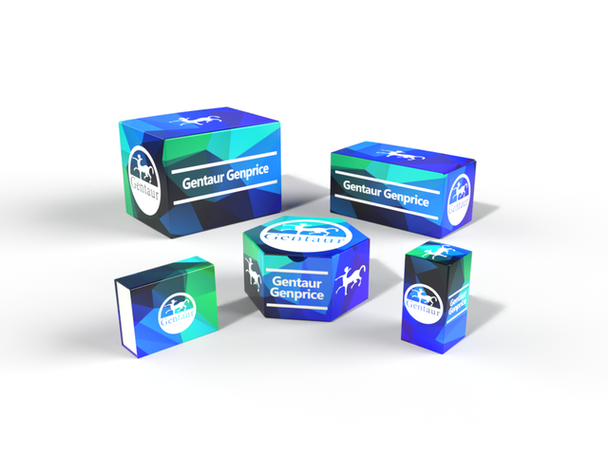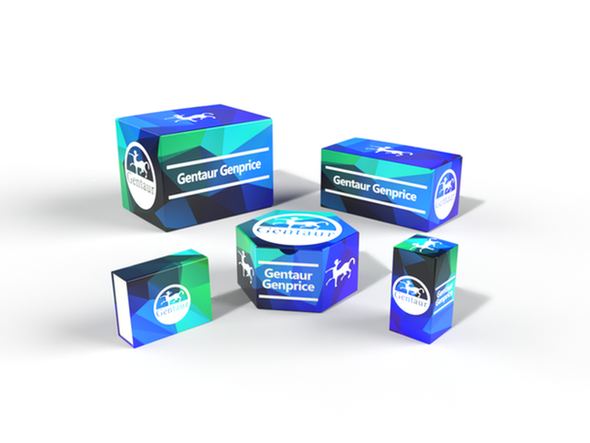749
Human Oxidized lowdensity lipoprotein antibody (OLAb) ELISA Kit | KTE62478
- SKU:
- 749-KTE62478
- Availability:
- Usually ships in 5 working days
Description
Human Oxidized lowdensity lipoprotein antibody (OLAb) ELISA Kit | KTE62478 | Gentaur UK, US & Europe Distribution
Application: This Human Oxidized lowdensity lipoprotein antibody (OLAb) ELISA Kit employs the competitive enzyme immunoassay technique. The microtiter plate provided in this kit has been pre-coated with an antibody specific to OLAb. Standards or samples are then added to the appropriate microtiter plate wells with a Horseradish Peroxidase (HRP) -conjugated OLAb and incubated. The competitive inhibition reaction is launched between with HRP labeled OLAb and unlabeled OLAb with the antibody. A substrate solution is added to the wells and the color develops in opposite to the amount of OLAb in the sample. The color development is stopped and the intensity of the color is measured.
Detection Method: Colorimetric
Conjugate: N/A
Sample Type: Cell culture supernatants#Serum#Plasma#Other biological fluids
Assay Type: Multiple steps standard sandwich ELISA assay with a working time of 3-5 hours. It depends on the experience of the operation person.
Kit Component: • Human Oxidized lowdensity lipoprotein antibody microplate
• Human Oxidized lowdensity lipoprotein antibody standard
• Human Oxidized lowdensity lipoprotein antibody detect antibody
• Streptavidin-HRP
• Standard diluent
• Assay buffer
• HRP substrate
• Stop solution
• Wash buffer
• Plate covers
Features & Benefits: Human Oxidized lowdensity lipoprotein antibody (OLAb) ELISA Kit has high sensitivity and excellent specificity for detection of Human OLAb. No significant cross-reactivity or interference between Human OLAb and analogues was observed.
Calibration Range: Please inquire
Limit Of Detection: Please inquire
Usage Note: • Do not mix components from different kit lots or use reagents beyond the kit expiration date.
• Allow all reagents to warm to room temperature for at least 30 minutes before opening.
• Pre-rinse the pipet tip with reagent, use fresh pipet tips for each sample, standard and reagent to avoid contamination.
• Unused wells must be kept desiccated at 4 °C in the sealed bag provided.
• Mix Thoroughly is very important for the result. It is recommended using low frequency oscillator or slight hand shaking every 10 minutes.
• It is recommended that all samples and standards be assayed in duplicate or triplicate.
Storage Instruction: The unopened kit should be stored at 2 - 8°C. After opening, please store refer to protocols.
Shipping: Gel pack with blue ice.
Precaution The product listed herein is for research use only and is not intended for use in human or clinical diagnosis. Suggested applications of our products are not recommendations to use our products in violation of any patent or as a license. We cannot be responsible for patent infringements or other violations that may occur with the use of this product.
Background: Hypercholesterolemia is closely associated with increased risk of atherosclerosis. The cholesterol accumulated in the atherosclerotic plaque is derived primarily from low-density lipoprotein (LDL) . Oxidation of LDL is now accepted as a critical event in the atherogenic process. Free radicals like superoxide and nitric oxide (-O2, NO) generated in biological reactions in the body contribute to the oxidation of LDL. The NO radical has been shown to oxidize apolipoprotein B a constituant of LDL. Similarly, lipoxygenases and oxidants like peroxynitrite can oxidize the lipid moieties in LDL. It has been demonstrated that oxLDL and not native LDL is taken up by scavenger receptors on monocytes, smooth muscle cells and macrophages in the blood vessels. The oxidation of LDL increases the affinity of oxLDL to acetyl receptors of macrophages. As this pathway of oxLDL uptake is unregulated, it results in the formation of lipid-laden macrophages (foam cells) .
Alternative Names: OLAb
Search name: OLAb
Tag: OLAb






